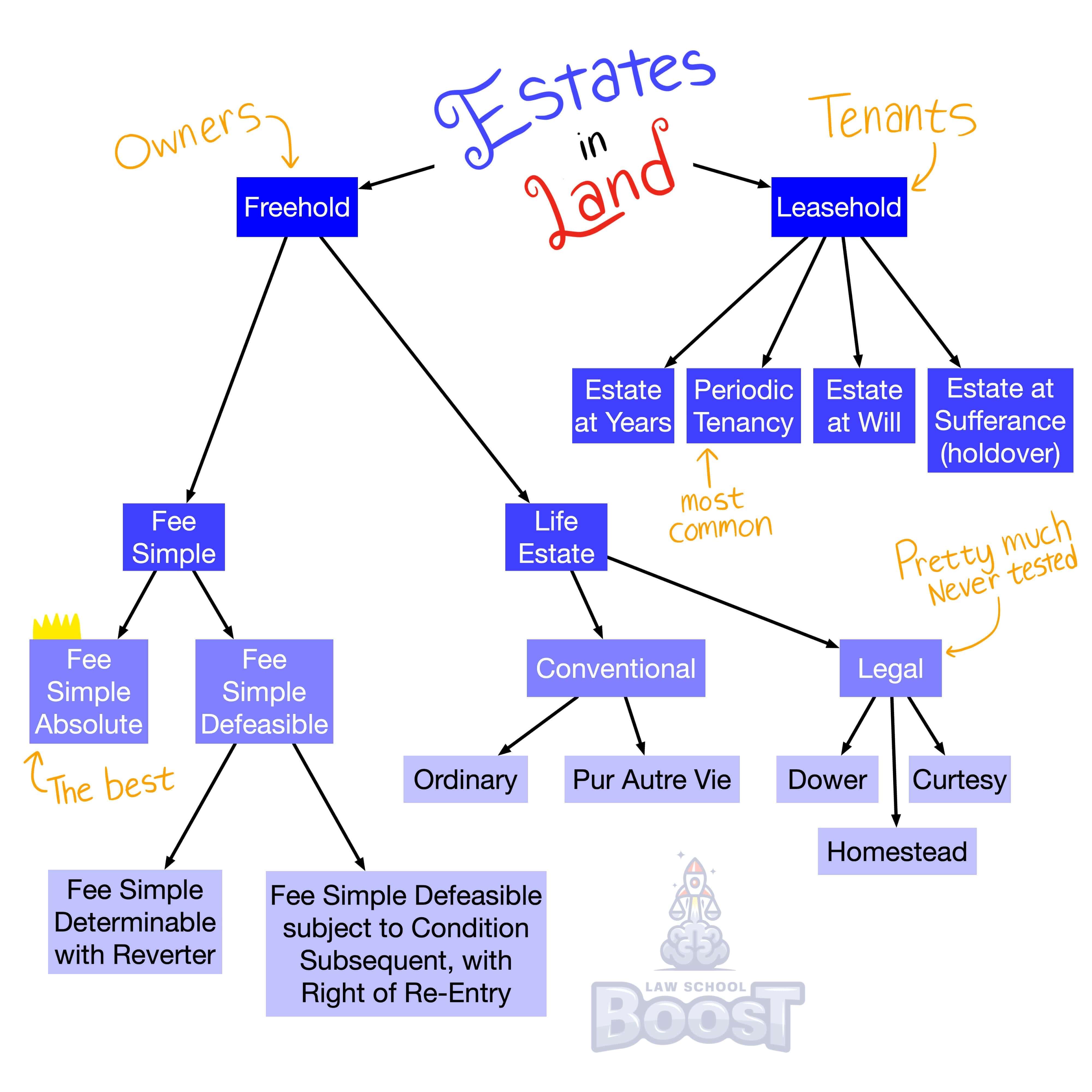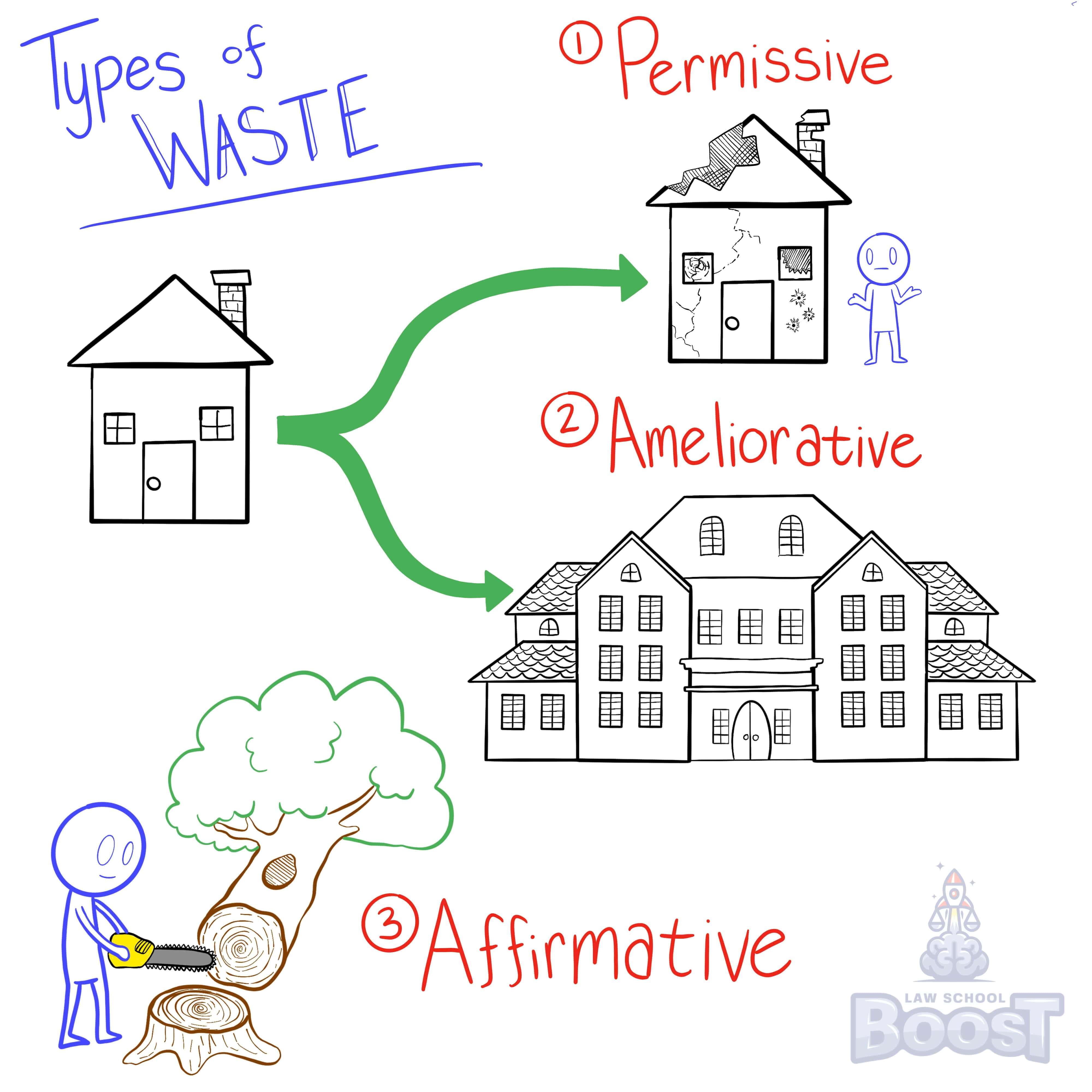😀
Real Property • Landlord-Tenant
PROP#069
Legal Definition
A tenant cannot damage the premises, and is responsible for waste. Generally, a tenant is liable for all ordinary repairs, excluding wear and tear.
Plain English Explanation
A tenant has a duty to not allow the property they possess to fall to shambles through neglect. There are essentially 3 parts to this. The first is that they aren't allowed to commit waste. If you've made it this far, you've likely already seen waste discussed under life estates, and it's basically the same for tenants (though we'll cover it in separate cards).
The second part of this duty is to make ordinary repairs. Obviously "ordinary repairs" is a fairly broad concept, which means you'll need to argue it on an exam. But think of "ordinary repairs" as those things that don't take much effort to do but prevent larger issues from happening. For example, replacing a leaky roof on a house is not an ordinary repair, but plugging or fixing a leak in a roof is. Likewise, fixing a leaky window likely is. The law doesn't expect the tenant to unjustly enrich the landlord, but they are expected to not ignore issues that can become big problems. Other ordinary repairs may include hiring a plumber to fix a sink that the tenant clogged, or cleaning grease off the stove. Keep in mind that a tenant need only return the property to the landlord in the condition that they accepted it, so "ordinary repairs" would be any that meet that standard.
Finally, the third part is to be clear that tenants are not liable for "ordinary wear and tear". What is wear and tear? That's for you to argue on the exam. Generally speaking, wear and tear is the normal and unavoidable evidence of use that occurs when a property is reasonably lived in. For example, a few stains on carpet are normal wear and tear. Dirty grout, or a few scuffs on the walls are also wear and tear. In other words, the hole in the wall that was caused when your buddy did a drunken handstand in the living room: you need to pay for it. But the scuff on the wall that was caused when you moved a chair? That's the landlord's problem.
The second part of this duty is to make ordinary repairs. Obviously "ordinary repairs" is a fairly broad concept, which means you'll need to argue it on an exam. But think of "ordinary repairs" as those things that don't take much effort to do but prevent larger issues from happening. For example, replacing a leaky roof on a house is not an ordinary repair, but plugging or fixing a leak in a roof is. Likewise, fixing a leaky window likely is. The law doesn't expect the tenant to unjustly enrich the landlord, but they are expected to not ignore issues that can become big problems. Other ordinary repairs may include hiring a plumber to fix a sink that the tenant clogged, or cleaning grease off the stove. Keep in mind that a tenant need only return the property to the landlord in the condition that they accepted it, so "ordinary repairs" would be any that meet that standard.
Finally, the third part is to be clear that tenants are not liable for "ordinary wear and tear". What is wear and tear? That's for you to argue on the exam. Generally speaking, wear and tear is the normal and unavoidable evidence of use that occurs when a property is reasonably lived in. For example, a few stains on carpet are normal wear and tear. Dirty grout, or a few scuffs on the walls are also wear and tear. In other words, the hole in the wall that was caused when your buddy did a drunken handstand in the living room: you need to pay for it. But the scuff on the wall that was caused when you moved a chair? That's the landlord's problem.
Visual Aids


Related Concepts
How do lease covenants affect a landlord-tenant relationship where one party breaches?
How may a landlord waive a covenant prohibiting assignment?
If a leasehold is condemned or taken via eminent domain, what is the effect on a tenant's duty to pay rent?
If an assignment occurs, what is the relationship between the assignee and the landlord?
If a tenant breaches one or more of their duties, what remedies are available to the landlord?
If a tenant violates a covenant against assignment or sublease, what remedies are available to the landlord?
In a landlord-tenant relationship, who has a duty of restoration when the premises being leased are destroyed due to no fault of either party?
In assessing a landlord's tort liability, what six duties does a landlord have to make the premises safe?
In assessing a landlord-tenant issue, what is an assignment?
In assessing a landlord-tenant relationship, what are the landlord's duties?
In assessing a landlord-tenant relationship, what are the tenant's duties?
In assessing a landlord-tenant relationship, what is the result of a tenant's covenant to repair?
What are the exceptions to the hold-over doctrine?
What constitutes a constructive eviction?
What constitutes an actual eviction?
What constitutes a partial eviction?
What is a landlord's duty to deliver possession?
What is a landlord's duty to provide quiet enjoyment?
What is a landlord's duty to repair?
What is a leasehold estate?
What is a periodic tenancy and how does it terminate?
What is a retaliatory eviction?
What is a sublease?
What is a tenancy at sufferance and how does it terminate?
What is a tenancy at will and how does it terminate?
What is a tenancy for years and how does it terminate?
What is a tenant's duty to not use the premises for an illegal purpose?
What is a tenant's duty to pay rent, and how does it affect their security deposit?
What is the hold-over doctrine?
What is the implied warranty of habitability, and what remedies are available to the tenant if breached?
When does a covenant run with the land?
When does a tenant cause ameliorative waste?
When does a tenant cause permissive waste?
When does a tenant cause voluntary waste?


